---------------------------------------------------------
If you live in an area with harsh winters, keeping your chickens happy year round can be a challenge. Being prepared for winter weather will help your flock stay healthy & warm all winter long. Check out my top 7 tips for keeping your chickens happy this winter!
Winterize your coop & run
Right around November every year I like to completely empty my coop, do a good cleaning, and check for any issues. Repair any holes or damage that could let drafts, snow, or rodents looking for a warm bed in. click here to read more about rodent proofing your coop. I like to pile the shavings high in the coop and won’t clean it out again until around May, using the deep litter method. This method utilizes the composting chicken manure to produce warmth. Click here to read about maintaining a deep litter coop.
Wrap your chicken run in thick, clear plastic to create a greenhouse effect to capture daytime warmth. The plastic also stops snow from blowing in the run. Chickens hate walking on snow! Check over the roosts, make sure they are in good condition and there is enough roost space for all your chickens. You want about 8-12 inches per bird. Huddling together keeps them warm and being able to hide their toes/legs in their warm body on the roosts keeps frostbite away.
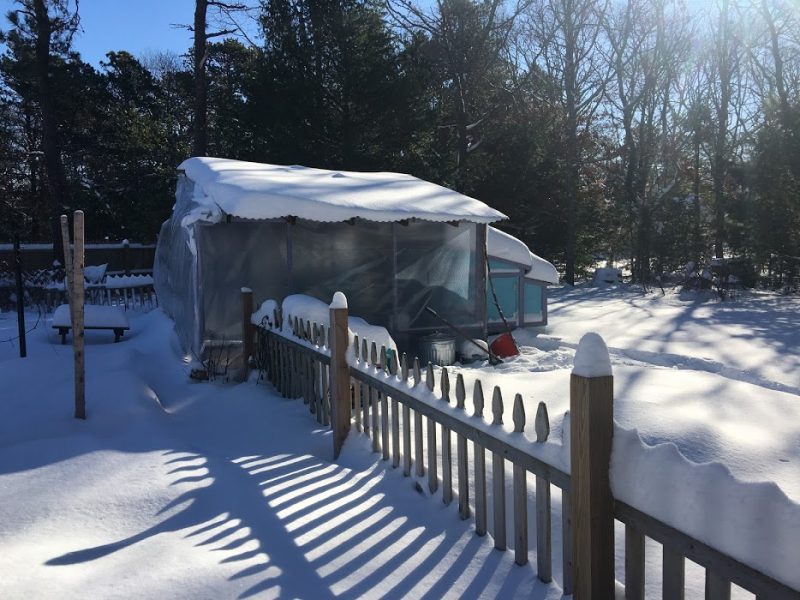
Ventilation is important
You might think that you need to make your coop airtight to keep your flock warm, but that is not a good idea. Ventilation is just as important in the winter months as it is in the summer heat. Chicken poop and chicken breathing produce a lot of moisture. If you don’t provide a place for that moisture to escape, it will settle on your chickens, leaving them prone to frostbite on their combs & wattles. A good investment for your coop is a humidity monitor. Aim to keep coop humidity below 70%. If your coop is small, you may need to keep the waterer outside to keep the humidity down. If possible, position the ventilation so that they don’t have drafts blowing across the roosts at them all night. click here to read more about frostbite and your flock
Make a plan for their water
You need to provide your flock with liquid water all year round. When the temperature gets below freezing that can be a challenge. If your winters are mild, you can likely get away with just checking and changing the water twice a day. If you live where winters are harsh, like me, you will want to invest in some heated water options.
We use heated pet bowls so both our ducks and chickens can access them. But if you only have chickens and you already have a metal water font, they also make heated pads that you can place the waterer on. Heated waterers also come in plastic models. Most work by only kicking on when the temperatures dip below freezing, so they don’t really provide warm water, they just keep it from freezing over. You will need a power source for these bowls, if you don’t have outlets in your coop, you can run a long extension cord to the bowl. click here to read more about winter water options.
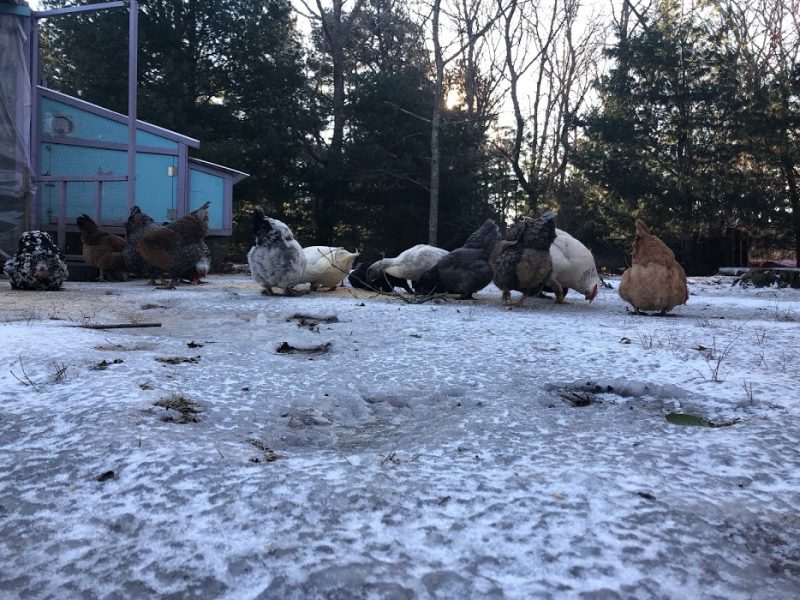
Bedtime treats
On your next trip to the feed store, grab a bag of scratch. Mostly corn grains, scratch takes them a little more work than feed to digest. The digestive action helps keep them warmer (and full!) longer. I like to give them some scratch at night so they can head to bed with full tummies.
Don’t add heat
Space heaters in a coop are a fire hazard. There is a lot of dry bedding and lots of erratic moving animals. A coop fire is devastating – you lose your flock and your coop plus it could get even worse and spread to your home or your neighbor’s home. Chicken body temperature runs about 106 degrees, they have a thick layer of insulating underfeathers and fat to help keep them warm. Selecting heavy, cold hardy chicken breeds will help (click here to read more about winter hardy breeds).
In case you need another reason to not heat your coop, keep in mind that if your power goes out in a storm so does the heat for your birds. In an unheated coop, chickens have had weeks of gradually colder weather to acclimate their bodies. Chickens in cold weather grow thicker feathers, they eat more to bulk up. Birds in a heated coop have a false sense of security and have not acclimated to the cold, which means you will need to bring them inside your house or risk losing them in a power outage.
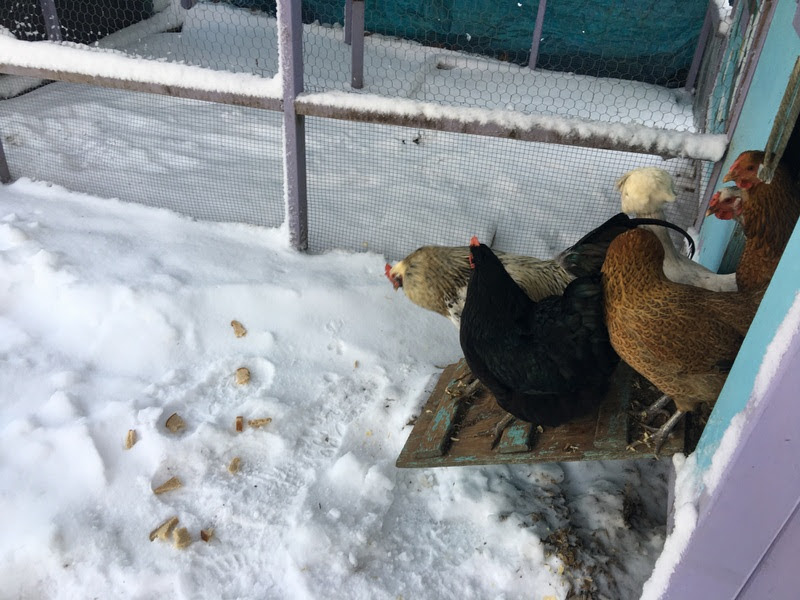
Decide if you will be supplementing light
Chickens need 14-16 hours of sunlight to signal to their overies to produce an egg. During the short winter day you will notice a drastic decline in egg laying. You can accept this season of slow egg production, or you can “trick” your girls into thinking the days are longer by adding lighting to the coop. Click here to read more about how to add supplemental lighting.
Be sure to check your nest boxes frequently despite the lack of eggs. Eggs expand as they freeze, cracking the shell. Broken shells invite bacteria and need to be thrown away. You don’t want to waste the few eggs you are getting!
Provide them things to keep them busy
Your chickens are unlikely to be doing much outdoor exploration when there is snow on the ground. They will go outside in their plastic covered run, and maybe a few brave ones will briefly head out to free range for short periods of time. There are no bugs to eat, no grass, and the snow on their toes lowers their body temperature so they won’t stand in it for long.
Especially if your flock is used to free ranging and are now confined to coop & run, they are going to be bored. Bored chickens often pick on each other. You might notice more fighting in the winter. You can add a chicken swing or branches in the run for climbing. Try adding a flock block for them to pick at. I have made fruit & veggies garlands for them, and strung up a head of cabbage for them to bat around. Click here to read about making a chicken garland
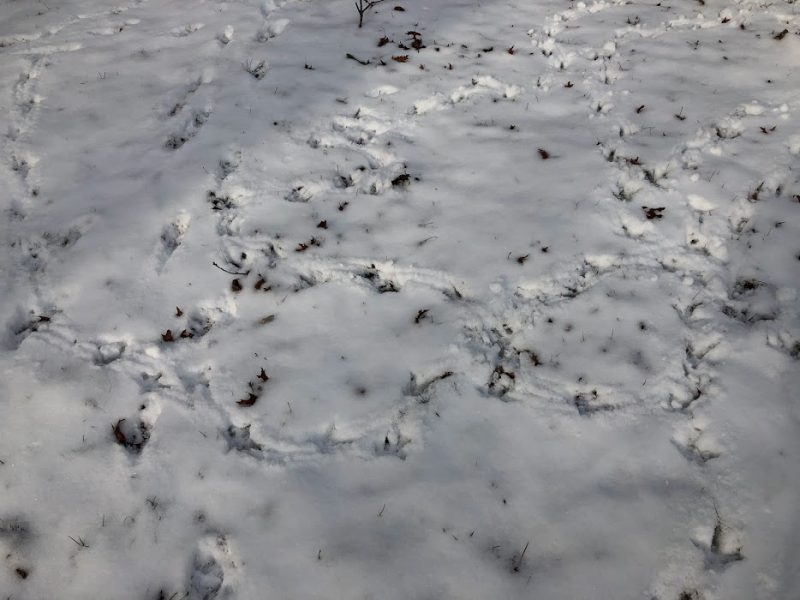
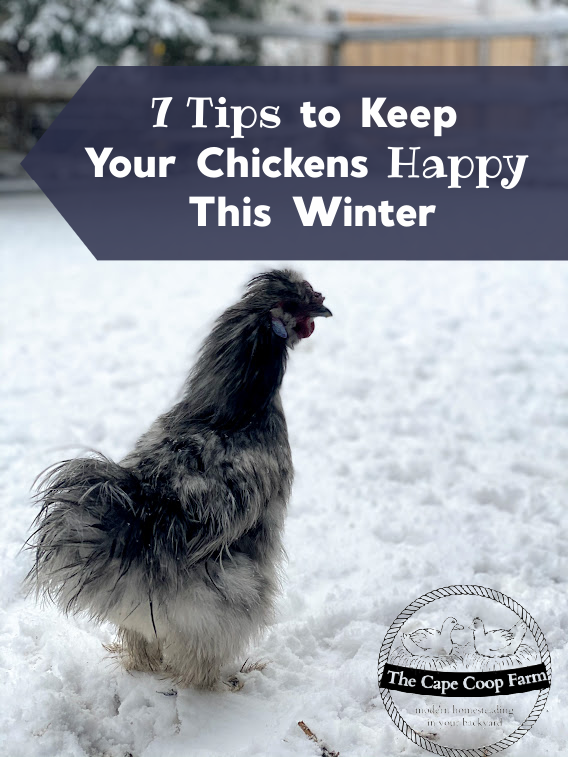




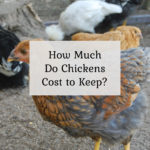
nancy
Wednesday 23rd of December 2020
Nice ideas! We have the same kind of plastic walled extension on our coop , photo here http://littlehomesteadinboise.blogspot.com/2020/12/things-im-grateful-for-easy-coop-winter.html
Liz
Thursday 24th of December 2020
That looks great!